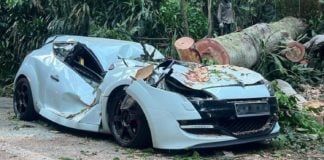TinyGene Academia Has Relatable & Interactive Science Programmes
Ask your friends about their science lessons in school, and they’d probably recall reading notes about cells, chemical formulae, or quantum mechanics.
Just studying these topics might be abstract, until we get a chance to see how they relate to our lives. For instance, who knew our sleep patterns can be explained through science?
Seeking to introduce science through fun and relatable experiences, TinyGene Academia welcomes youths and parents to participate in their programmes to better understand the world around them.

From learning about our taste buds to how viruses are detected, participants will no doubt ‘graduate’ feeling a little smarter than their peers.
Prove you’re a morning or night person using DNA at TinyGene Academia
The night owls among us have probably heard the advice to sleep early one too many times so we can wake up rejuvenated in the morning.
But it doesn’t always come easy, and it might not be our fault. Instead, our DNA traits could be the reason why some of us are nocturnal.
To prove this, folks at TinyGene Academia offer the miniPCR Sleep Lab™ – Lark or Owl lesson, allowing participants to compare certain traits of their DNA to a ‘control’.

First, they’ll have to self-assess their sleeping patterns by answering a questionnaire. Then, like many other DNA-related experiments, the test requires participants to obtain a DNA sample by swabbing their inner cheeks.
They’d then have to ‘treat’ their samples by placing them into a gel and running solution. Wait for 30 minutes before observing them under blue light.

After comparing their differentiated DNA to control samples provided by the lab, participants will experience a ‘eureka’ moment when they find out if they’re a morning lark or night owl.
Participants can then cross-check this with the questionnaire to affirm the results.
DNA can also explore our taste buds’ sensitivity
Besides their sleeping habits, participants can also use DNA to explore their sensitivity towards specific tastes through the PTC taster Lab Lesson.

See, our DNA construct affects how intense certain foods taste when they hit our tongue—for example, why some people enjoy the taste of broccoli while others find it hard to ingest.
As part of the experiment, participants will be given reagents or strips to taste. Given how unique each person’s DNA is, participants will find themselves reacting differently.

Similar to the sleep pattern test, participants will also be able to analyse their DNAs and interpret their taste buds’ sensitivity towards various tastes found in vegetables.
Differentiate between common flu & serious viruses
Like Covid-19 and the common flu, it can be challenging to differentiate between some viruses based on symptoms alone.
If you’ve ever wondered how scientists and doctors diagnose patients with precision, the Viral Diagnostics Lab programme lets you become a healthcare expert for a day.
Participants will be asked to roleplay as a doctor and determine if patients are down with the common flu or a virus that’s far more infectious.
 Test for a specific virus via gel electrophoresis
Test for a specific virus via gel electrophoresis
Since both infections have similar symptoms, participants will have to examine DNA samples taken from 4 different patients and check for specific viral sequences.
In addition, participants will also learn about ‘false’ results and how they come about.
Deep dive into a world of science & understand yourself better
We currently live in a digital era that’s progressing towards a world of science fiction, except that things like flying cars and intelligent robots are no longer a figment of our imagination.
They exist in today’s society. To survive and adapt in this new world, education in STEM, i.e. Science, Technology, Engineering, and Mathematics, has become far more important.
However, the folks at TinyGene Academia realise that there is a tendency for students to focus on the engineering aspect over science due to the common misconception that sciencey subjects are drier and boring.
Obviously, that’s not true, given how scientific experiments reveal so much more about the human body.

You’ll get to understand why you are the way you are a lot better now. There’s no need to feel bad when you’re not the kind to wake up early or stay up late.
Deep dive into a world of biotechnology by taking part in TinyGene Academia’s tinyLABs lessons and experiments inspired by everyday questions.
Soon, you’ll impress everyone in the family by being an expert in explaining seemingly simple questions, such as why someone’s a picky eater or why plants are green.
TinyGene Academia has 15% off fees for first-time sign-ups
Other than the above programmes, TinyGene Academia also has various activities designed for kids aged 7-18. You can find the complete list of programmes here.
Curious parents can accompany their children for a weekend of scientific fun or even spark their interest in pursuing a career in the science industry.
From now till 31 Mar, TinyGene Academia is running a promotion where first-time users can enjoy 15% off programme fees.
All lessons will be held at their new centre in Kallang. Here’s what you need to know to get there.
TinyGene Academia (BioAcumen Global Pte Ltd)
Address: 158 Kallang Way, #05-10, Singapore 349245
Opening hours: 9am-6pm
Nearest MRT station: Geylang Bahru and Aljunied
For more information, check out their website here. You can also stay up to date with the latest lessons on their Facebook and Instagram pages.
Science can be fun for everyone
While some of us may dread science lessons back in school, we shouldn’t let that discourage us from satisfying our curiosity about the everyday science around us.
Who knows, seeking such answers could spark a newfound interest in the field and even propel us to pursue a future in it.
Start paying closer attention to the science around you, and take action to find out more.
This post was brought to you in collaboration with TinyGene Academia.
Featured image by MS News.

Drop us your email so you won't miss the latest news.









